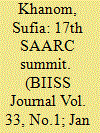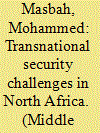|
|
|
Sort Order |
|
|
|
Items / Page
|
|
|
|
|
|
|
| Srl | Item |
| 1 |
ID:
117740


|
|
|
|
|
| Publication |
2012.
|
| Summary/Abstract |
This paper attempts to analyse the discussed issues and outcomes of the seventeenth SAARC Summit which took place in the Maldives from 10-11 November 2011 with a special reference to Bangladesh in the context of regional cooperation. Several significant and strategically important agreements were signed during this Summit with the intention to begin a new era of cooperation among the member countries. Therefore, the Summit declaration adopted several treaties like SAARC Agreement on Rapid Response to Natural Disasters, SAARC Seed Bank, SAARC Agreement on Multilateral Arrangement on Recognition of Conformity Assessment, and the SAARC Agreement on Implementation of Regional Standards. The agreements focused on enhancing and facilitating regional transit and connectivity, economic growth, ensuring energy security, combating terrorism and human trafficking and fight climate change. Though the Summit has come up with some promising mutual agreements, its success will depend on their proper and timely implementation. The lack of political will, problem of poor governance, weak economy and disparity, crisis of political leadership, ethnic, socio-cultural and religious divisions, challenges of non-state actors, transnational security challenges are considered to be the major hindrances to the success of regional integration. The South Asian region should develop its own short, medium, and long-term strategies for economic integration where each stage should be implemented effectively before moving on to the next in order to build a sound foundation for progress. The inclusion of China as 'dialogue partner' would help SAARC to make the tangible progress for regional cooperation in South Asia. The new focus on regional integrations is likely to create exciting opportunities for Bangladesh if it can exploit the synergies based on comparative advantages, investment in cross-border infrastructure projects, address challenges in governance, environmental and social developments.
|
|
|
|
|
|
|
|
|
|
|
|
|
|
|
|
| 2 |
ID:
128236


|
|
|
|
|
| Publication |
2014.
|
| Summary/Abstract |
States with limited statehood such as Somalia can cause transnational security challenges. The emergence of an insurgent group with links to Al Qaida and piracy emanating from its coast are cases in point. In this article, we tackle the question of whether the EU's comprehensive approach toward Somalia is working. To do this, we analyze its effectiveness, its legitimacy, and the influence of power by appraising three characteristics of the security governance concept in a critical manner. We conclude that the result is mixed. Even if the EU's comprehensive approach were perfect in a technical sense, it would still face restraints, because any solution has to come from Somali themselves. Not only should they be an integral part of it, they should become the real owners of the state-building process in the first place.
|
|
|
|
|
|
|
|
|
|
|
|
|
|
|
|
| 3 |
ID:
163758


|
|
|
|
|
|
|
|